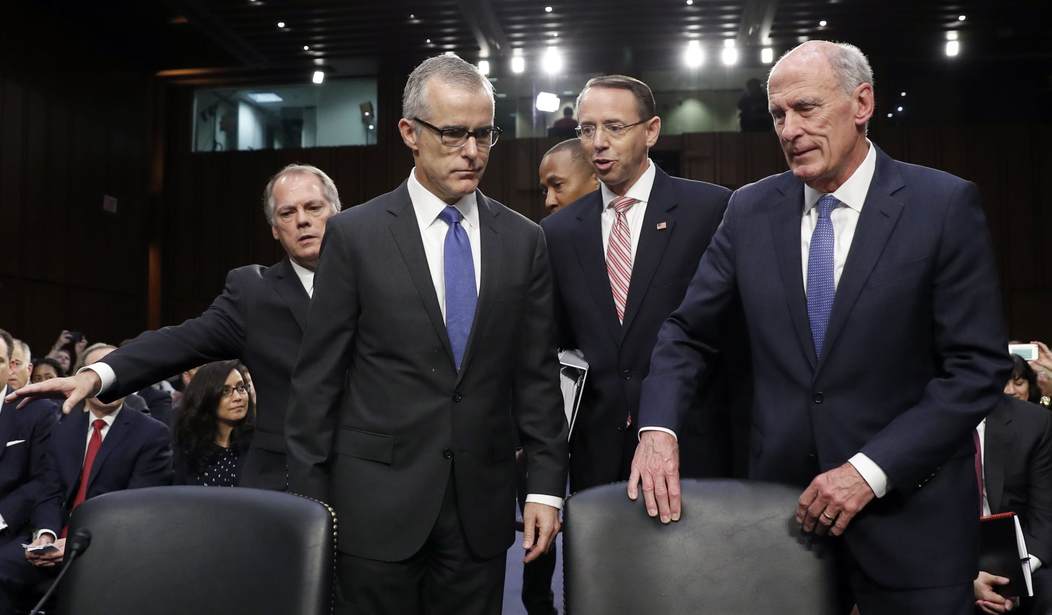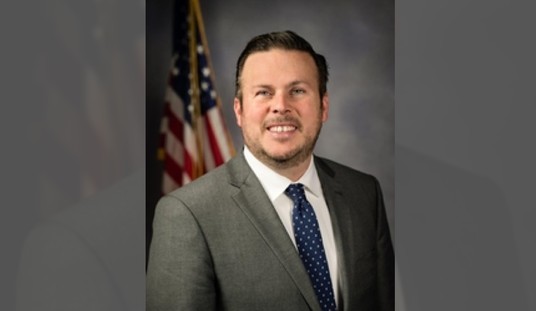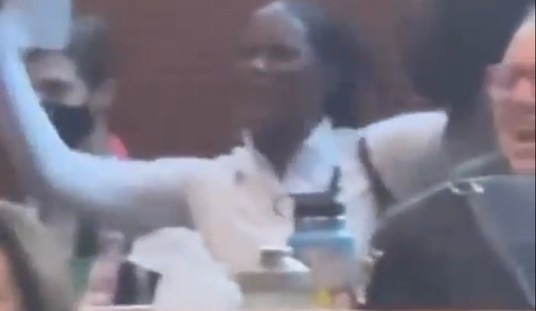WASHINGTON — Director of National Intelligence Dan Coats told senators at a FISA review hearing Tuesday that “there have been no instances of intentional violations of Section 702,” which allows the collection of communications of foreigners outside the country as well as the incidental collection of Americans in touch with those foreign targets.
Coats, National Security Agency Director Adm. Mike Rogers, Deputy Attorney General Rod Rosenstein and Acting FBI Director Andrew McCabe lobbied for the renewal of the Foreign Intelligence Surveillance Act, which expires at the end of the year, at a Senate Intelligence Committee hearing.
Sen. Dianne Feinstein (D-Calif.), a supporter of Section 702, noted that in 2016 there were 106,469 authorized targets out of 3 billion internet users.
“The question of unmasking has been raised. It’s my understanding that 1,939 U.S. person identities were unmasked in 2016 based on collection that occurred under Section 702,” Feinstein said.
Rosenstein stressed that it’s “important for people to recognize” unmasking is “an internal issue.”
“That is, that unmasking is done internally, you know, within the cloak of confidentiality, within the intelligence community,” he said. “That’s a different issue from leaks. In other words, if somebody’s identity is disclosed internally because it’s relevant for intelligence purposes — because that’s the goal of this collection, is to understand.”
Feinstein interjected that she’d “just listened to somebody who should have known better talking about unmasking in a political sense — that it’s done politically.”
“And that, of course, is not the case,” she added. “And so what I’m looking for is the definition of how this is done and under what circumstances.”
Rogers explained that at the NSA “we define in writing who has the authority to unmask a U.S. person identity.”
“That is 20 individuals in 12 different positions. I am one of the 20 in one of those 12 positions, the director. Secondly, we outline in writing what — the criteria that will be applied to a request to unmask in a report — and again, part of our process under 702, to protect the identity of U.S. persons as part of our minimization procedures, when we think we need to reference a U.S. person in a report, we will not use a name. We will not use an identity. We say, ‘U.S. Person One, U.S. Person Two, U.S. Person Three,'” he continued.
“That report is then promulgated. Some of the recipients of that report will sometimes come back to us and say, ‘I’m trying to understand what I am reading. Could you help me understand who is Person One or who is Person Two, ect.?'”
Rogers said the unmasking request must be made in writing and “must be made on the basis of your official duties, not the fact that you just find this report really interesting and you’re just curious.” Also, “the basis of the request must be that you need this identity to understand the intelligence you’re reading.”
“We apply those three criteria, we do it in writing, and one of those 20 individuals then agrees or disagrees,” he said. “And if we unmask, we go back to that entity who requested it — not every individual who received the report, but that one entity who asked for us. We then provide them the U.S. identity, and we also remind them the classification of this report and the sensitivity of that identity remains in place.”
“By revealing this U.S. person to you, we are doing it to help you understand the intelligence, not so that you can use that knowledge indiscriminately. It must remain appropriately protected.”
Both Coats and Rogers have initiated reviews of the procedure, with Coats asking, “Are these the right procedures, should we be doing something different, would they have recommendations that better protected people from misuse of this?”
“Given all the attention, given the focus, let’s step back, let’s reassess this and let’s ask ourselves, is there anything that would suggest we need to do something different in the process?” Rogers added.
Sen. Marco Rubio (R-Fla.) asked if, during President Obama’s second term, there was “a significant uptick in efforts — in incidents of unmasking.”
“We have the data, but I don’t know that off the top of my head,” the NSA director replied. “I couldn’t tell you unmasking on a year-by-year basis for the last five years. I apologize, I just don’t know off the top of my head.”
Coats noted that, overall, “the amount of total collection has increased, generally, every year. It’s more and more impactful for us. It generates more and more value.”
Sen. Angus King (I-Maine) said he was concerned about “the process by which American names which are incidentally collected are then queried.”
“I’m concerned by the distinction between query and search, and where we run into the Fourth Amendment,” King said. “It strikes me as bootstrapping to say, ‘We collected it legally under 702, and then we can go and look at these American persons.’ And I believe that the Fourth Amendment imposes a warrant requirement in between that step, which is not present in the present process.”








Join the conversation as a VIP Member